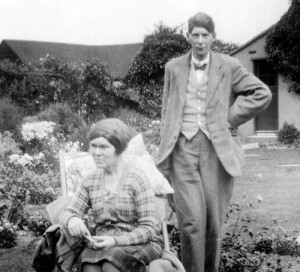 It is in The Last of Spring, one of Rupert Croft-Cooke’s many autobiographical volumes that one finds an account of the author’s experience of renting one of the Cornish bungalows built for writers by the eccentric spiritual medium and author, Mrs A.C. Dawson Scott, in the early 1930s.
It is in The Last of Spring, one of Rupert Croft-Cooke’s many autobiographical volumes that one finds an account of the author’s experience of renting one of the Cornish bungalows built for writers by the eccentric spiritual medium and author, Mrs A.C. Dawson Scott, in the early 1930s.
Croft-Cooke, armed with an advance of £20 from his publisher, Chapman Hall, following the success of his first novel was seeking a cottage in the country that would afford him the solitude and remoteness he needed to write a follow-up. He found one by answering an advert placed in a literary weekly by the novelist Dawson Scott, now better known as the founder of P.E.N. She herself lived in a holiday bungalow near Padstow and had had the idea of buying some land south of Trevose Head to build more bungalows which she would rent out to writers who needed a retreat.
The bungalows duly became a colony she called ‘ Constantine ‘, after the nearby ruins of a church and a Holy Well, aimed at providing accommodation for those attending the Cornish Art and Literature Season in July and August, when she charged £5 a week to tenants. Luckily, Dawson Scott, nicknamed ‘ Sappho’ by her family, charged Croft Cooke the off-season rate of only £1 a week. Meeting his landlady in her London flat to arrange the tenancy was a daunting experience for the novelist. He found
‘ a forceful woman, decisive and grimly affable, obviously a born organizer. I never knew her in Cornwall, yet through vivid descriptions by Noel Coward, who was one of her early paying guests, and others, I see her in fancy in her Cornish setting, square, tanned, blatantly healthy, wearing a djibba, with the wet sand oozing up between her toes, and her hair undisciplined in the breeze, a woman with a purpose. ‘ Continue reading

